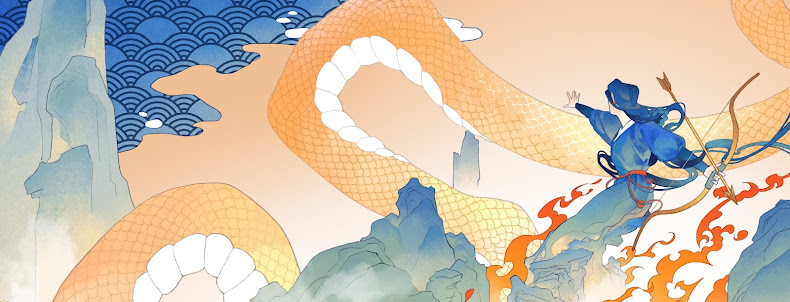Original Lyric Poem Calming
Wind and Wave (定風波):-
莫聽穿林打葉聲, 何妨吟嘯且徐行;
竹杖芒鞋輕勝馬, 誰怕? 一蓑煙雨任平生;
料峭春風吹酒醒, 微冷, 山頭斜照卻相迎;
回首向來蕭瑟處,歸去, 也無風雨也無晴。
My translation:-
Stop listening to the rain pattering on leaves,
Why not enjoy a
stroll, and sing your heart out?
Giving up the horse
for sandals and a cane – who would mind?
A straw cloak may
be all I need in misty rain.
The spring breeze wakes
me up from drowsiness – a bit chilly.
The setting sun warms
me though with embracing rays.
Turning back, still
mindful of that cold and wretched place.
Now that I have arrived
– home at last,
Nothing stirs me any
more, the glaring sun, the wind or the rain.
Original Lyric Poem Nian Nu Jiao: Reminiscing Red Cliffs (念奴嬌: 赤壁懷古):-
大江東去, 浪淘盡, 千古風雲人物。
古疊西邊, 人道是,
三國周郎赤壁;
亂石崩雲, 驚濤裂岸,
捲起千堆雪;
江山如畫, 一時多少豪傑。
遙想公瑾當年, 小喬初嫁了,
雄姿英發;
羽扇綸巾, 談笑間,
強虜灰飛煙滅。
故國神遊, 多情應笑我,
早生華髮,
人生如夢, 一樽還酹江月。
My English Rendition:-
The Great Yangtze scurries forever east,
Many an ancient hero buried in its sweep.
West of the old forts,
they say,
Was fought Zhou Yu’s Battle of Red Cliffs;
Was fought Zhou Yu’s Battle of Red Cliffs;
Rampant
cliffs that pierced clouds,
Angry waves that ripped shores, churning up snowy foam.
Such a picturesque country,
So full of gallant men in times of old.
Angry waves that ripped shores, churning up snowy foam.
Such a picturesque country,
So full of gallant men in times of old.
Thinking of Zhou in that distant past,
He must've looked valiant, with Xiaoqiao his new bride;
He must've looked valiant, with Xiaoqiao his new bride;
Feather fan in
hand, hair tied in silk,
His enemies crushed to dust as he joked.
His enemies crushed to dust as he joked.
Such was my dreamy
tour; mock me as maudlin,
But I’m just a young white-haired bloke.
But I’m just a young white-haired bloke.
Life is but a
dream; let me offer wine to the river moon.
[Note: This lyric poem was written during the time when Su Shi was serving as a junior official in Wang Zhou (黃州) (in Hubei Province), to which he was banished after his release from prison. His imprisonment had been brought about by his writing a politically-incorrect poem called Crow Terrace Poem (烏臺詩). Nian Nu Jiao: Reminiscing Red Cliffs reflects his dramatic change of outlook on life after experiencing the near-death trauma (as imprisonment could well turn into a death sentence on a momentary whim of the emperor). The “Crow Terrace Case” was an incident in which Su Shi’s Crow Terrace Poem was deliberately taken out of context by his adversaries to make it sound like an offending accusation against the emperor. The whole incident made him feel not only wronged, but also helpless within the then prevalent officialdom where knavery and chicanery thrived. His cherished ideal of serving his country was wrecked by the incident.
Thus, the tone of the lyric poem is one of unfulfilled mission and ruefulness. In recalling Zhou Yu’s (a handsome and gallant general of the Three Kingdoms period) once heroic and romantic deeds, which had nevertheless evaporated into the time river of no return, the poet was trying to express his own helplessness and the heartbreak of unrequited love for his country and his emperor. By implication, the poet wanted to say that as admirable and noble as Zhou, he had only lived a short life of 36 years. So, what right did he have, being a much less accomplished person than Zhou, to complain about petty failures? The undertone is sad (about the vicissitudes of life) though redemptive (because of his unchanging love for his picturesque country).]
Original Poem Plum Blossoms Poem (“梅花詩”):-
春來幽谷水潺潺 ,的皪梅花草棘間。
一夜東風吹石裂 ,半隨飛雪渡關山。
My English Rendition:-
Chanting spring creek through the hushed valley fares;
Among thorn bushes, plum blossoms shimmer in a glare.
One night an east gale surges, with stone-shattering force;
Half the petals, with blowing snow, o’er the border they dare.
Original Poem Impromptu Writing on a Xilin Wall (“題西林壁”):-
橫看成嶺側成峰, 遠近高低各不同。
不識廬山真面目, 祗緣身在此山中。
My English Rendition:-
These Lushan mountains often fool our eyes,
Rolling range one minute, towering crest the next.
Their true portrait from all people hides,
‘Cos they happen to be on the inside.
